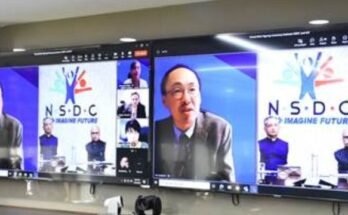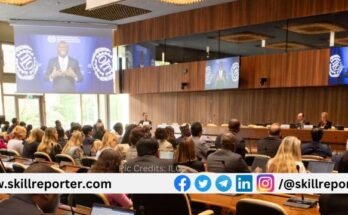Skills for Prosperity in South East Asia Programme (SfP-SEA) – Malaysia
Type of Project: Service Contract
Duty Station: Home-based/on-line.
Languages Required: English.
Beneficiary Countries: Indonesia, Malaysia, Myanmar, Philippines, Thailand, Singapore, Vietnam
Background
The Skills for Prosperity in South-East Asia Programme (SfP-SEA) aims to contribute to increasing national capacity to achieve sustained and inclusive growth through the enhancement of skills development and technical and vocational education and training (TVET) systems in Malaysia, Indonesia, and the Philippines.
To achieve this objective, the programme works with government agencies, employers’ organisations, trade unions, TVET and skills institutions and other partners in Malaysia, Indonesia and the Philippines to facilitate review and reform of the countries’ skills development and TVET system strategies and policies. In the region, the SfP-SEA provides opportunities for mutual learning among the three countries and the other ASEAN nations, and beyond—not only showcasing the results of the pilots and lessons learned from the programme but also facilitating the sharing of best practices in the region and other parts of the world.
In Malaysia, the Programme focuses on increasing skills development and TVET systems’ readiness to meet the skills needs of the future of work and those of vulnerable groups, through enhancing four areas of the TVET system and delivery:
Equity: Inclusiveness in skills development and TVET systems
Quality: Future-ready & coordinated skills development and TVET systems
Relevance: Demand-driven skills and TVET/skills recognition
Cost-Effectiveness: Improved skills/TVET financing models
The SfP-Malaysia Project focuses on TVET inclusiveness, quality, relevance and readiness whilst addresses skills mismatch issues in the area of critical needs for skills development and TVET to support industry development and socio-economic progress. It intends to assist national partners in improving policies to ensure industry-led TVET in public and private sectors and increase employment and career progress opportunities for TVET students at national and sub-national levels. The national and sub-national activities at two states, namely Sabah and Kedah, will target:
– The primary beneficiaries: youths (ages 16-25) and women; and
– Other beneficiaries (vulnerable groups):
- Members of the B40
- Persons with Disabilities
- Individuals Not In Employment Education or Training (NEET)
- Small and medium-sized enterprises (SMEs)
- Workers in the informal economy
- Self-employed individuals
- Individuals employed in the gig economy
Under the programme area of “Quality”, the SfP-Malaysia aims to increase national capacity for inclusive economic growth by supporting the development of future-ready and coordinated skills and TVET systems. This includes the development of a bigdata supported skills demand analysis system to address skills mismatch between industry demand and TVET/skills supply at a national level.
The SfP-Malaysia has been assisting the Government of Malaysia in developing the National skills Registry (NSR), an on-line database that will contain comprehensive information about occupations and skills, as a part of the Labour Market Information Analytics Platform (LMIAP).
Objective
In order to assist national partners in developing the NSR, the SfP-Malaysia seeks an international contractor with expertise in developing and administering occupation and skills taxonomies, skills frameworks, and the nation-wide occupation and skills database. The objectives of this assignment are to:
- Provide the comprehensive picture of existing skills frameworks in Malaysia in a systematic way.
- Analyse strengths and weaknesses of existing skills frameworks and identify the value proposition of the NSR.
- Develop the strategies to integrate existing skills framework into the NSR as a common reference framework.
- Develop the midterm roadmap towards the development and maintenance of full-fledge NSR, in close consultation with stakeholders, including government agencies, employers’ and workers’ organisations, and other social partners.
Scope of Work
Under the supervision of Chief Technical Advisor and with guidance from Senior Project Officers, and specialists of the ILO, and in cooperation with national consultants hired separately, the main responsibility of the contractor is to:
- Provide international perspectives in finalising a comprehensive stock-taking and mapping study of existing skills frameworks, which should provide a basis and justification for the development of the NSR, taking into account of national partner needs.
- Provide international perspectives in developing the strategies to integrate existing skills frameworks into the NSR and formulate the mid-term roadmap to develop and maintain the full-fledged NSR.
Output
Under the supervision of the Chief Technical Advisor and with guidance from Senior Programme Officers, regional specialists of the ILO, the international contractor is required to produce the following outputs.
Output 1: Work plan and the implementation structure, including internal quality assurance mechanism, developed.
-
- Draft the work plan for all tasks, which includes:
a) Detailed plan of activities with a timeline including the person in charge of each activity.
b) Names of external partners for relevant activities.
c) Implementation structure, including the responsibilities of team members.
d) Internal quality assurance mechanisms for the stock-taking and mapping report (e.g. this list of reviewers and quality control process). - Refine the implementation structure, including the responsibilities of team members, and the internal quality assurance mechanisms for written outputs.
- Submit the work plan and the implementation structure to the ILO.
- Draft the work plan for all tasks, which includes:
Output 2: International perspectives provided for the final report for stock-taking and mapping.
-
-
- Written input to the first draft final report for stock taking and mapping provided.
- Review the draft final report to be developed by the national consultants through on-line meeting with them as needed. The report will include but not limited to the following items.
a) Introduction, including the objective of stock taking and mapping.
b) Brief overview of existing occupational and skills frameworks and a brief history of their development processes.
c) Problem statement (e.g. why Malaysia has different frameworks for each sector).
d) Research methods, including analytical framework, data collection methods and results, and the summary tables of interviewees.
e) Comprehensive case studies of selected occupational and skills, including:
i) The map of existing occupational and skills frameworks, which depicts their positions and relationships.
ii) The matrix which summarises key findings and characteristics of each occupational and skills framework.
iii) Similarities, differences, and relationships in the structures of selected occupational and skills frameworks.
iv) Advantages and drawbacks of each framework (e.g. lack of information and data, quality issues, etc.) from the perspective of those involved in implementing the skills framework and end-users of the frameworks (e.g. TVET/skills institutions, industry, etc.),
v) Designing, administration, and maintenance mechanisms of each skills framework.
f) Recommendations for the development of the NSR, including but not limited to:
i) The framework and structure of NSR.
ii) Refined content structure and initial content model for NSR.
iii) Strategies for collaboration between government agencies which administer existing occupational and skills frameworks.
iv) Possible linkage between the NSR and existing occupational and skills frameworks and the integration strategies.
v) The concept, structure, and contents of the NSR and NSR skills taxonomy.
vi) Activities to be added or revised for the work plan for the NSR development.
vii) Toward the development of the mid and long-term roadmap for the full-fledged NSR. - Draft the written input based on international experience in developing the nation-wide occupation and skills database or frameworks and submit it to the ILO and its national consultant.
- Present key points of the written input through an on-line meeting in which the ILO, its national consultants, and national partners will participate.
- Review the draft final report to be developed by the national consultants through on-line meeting with them as needed. The report will include but not limited to the following items.
- Output 2.2 The written input to the second final draft report provided.
- Review the second draft final report submitted by the national consultants.
- Draft the written input based on international experience in developing the nation-wide occupation and skills database or frameworks and submit it to the ILO and the national consultants.
- Present key points of the written input through an on-line meeting in which the ILO, the national consultants, and national partners will participate.
- Written input to the first draft final report for stock taking and mapping provided.
-
Output 3: International perspectives provided for the integration strategies of existing occupational and skills framework.
- Output 3.1 Written input to the draft integration strategies of existing occupational and skills framework provided.
- Review the draft integration strategies of existing skills frameworks to be developed by the national consultants through on-line meeting with them as needed. The strategies should include but is not limited to:
a) Relationship between the NSR and existing occupational and skills frameworks.
b) Possible steps, challenges, and solutions to integrate existing skills frameworks to the NSR.
c) Final pictures of the relationship between the NSR and other occupational and skills frameworks. - Draft the written input based on international experience in developing the nation-wide occupation and skills database or frameworks and submit it to the ILO and its national consultants.
- Present key points of the written input through an on-line meeting in which the ILO, the national consultants, and national partners will participate.
- Review the draft integration strategies of existing skills frameworks to be developed by the national consultants through on-line meeting with them as needed. The strategies should include but is not limited to:
- Output 3.2 Written input to the final draft integration strategies of existing occupational and skills framework provided.
- Review the draft integration strategies of existing skills frameworks to be developed by the national consultants through on-line meeting with them as needed.
- Draft the written input based on international experience in developing the nation-wide occupation and skills database or frameworks and submit it to the ILO and the national consultants.
- Present key points of the written input through an on-line meeting in which the ILO, the national consultants, and national partners will participate.
Output 4: International perspectives provided for the roadmap towards the full-fledged NSR.
- Output 4.1 Written input to the draft outline of the roadmap toward the development of the full-fledged NSR provided.
- Review the draft outline of medium or long-term roadmap for the full-fledged NSR development to be developed by the national consultants through on-line meeting with them as needed. The roadmap will include but not limited to:
a) Updated mission statement.
b) Updated Objectives.
c) Framework.
d) Ecosystem.
e) Governance Structure.
f) Components & functionality.
g) Content model.
h) Maintenance mechanism
i) Implementation timeline in phases.
j) Proposed leaders/leading organisation for listed tasks.
k) Expansion plan for all the sectors. - Draft the written input based on international experience in developing the nation-wide occupation and skills database or frameworks and submit it to the ILO and the national consultants.
- Present key points of the written input through an on-line meeting in which the ILO, the national consultants, and national partners will participate.
- Review the draft outline of medium or long-term roadmap for the full-fledged NSR development to be developed by the national consultants through on-line meeting with them as needed. The roadmap will include but not limited to:
- Output 4.2 Written input to the draft roadmap toward the full-fledged NSR provided.
- Review the draft roadmap submitted by the national consultants.
- Draft the written input based on international experience in developing the nation-wide occupation and skills database or frameworks and submit it to the ILO and the national consultants.
- Present key points of the written input through an on-line meeting in which the ILO, the national consultants, and national partners will participate.
- Output 4.3 The the-end-of-assignment report submitted.
- Develop and submit the-end-of-assignment report, which include:
a) Summary of activities conducted.
b) Summary of main results.
c) Proposal for the ILO and national partners to ensure the sustainability of activity results.
d) List of deliverables submitted and the softcopy of all deliverables.
- Develop and submit the-end-of-assignment report, which include:
Indicative Timeline
The estimated number of workdays for this consultancy is 20 days spreading over 2 months and 9 days from 22 May 2023 to 31 July 2023.
Required Qualifications
The assignment should be carried out by the contractor who should have team members with the following expertise/qualifications:
Education: Advanced university degree in social sciences, education, human resource development, or public administration, with expertise in the field of TVET/skills development or labour economics.
Experience:
- A minimum of ten years of experience in TVET/skills development in terms of policy and framework development.
- Experience in:
- Carrying out qualitative research, in particular multiple case studies.
- Producing high-quality reports in English.
- Developing and administering national on-line occupation and skills database or equivalent in Asian or developed countries .
- Developing occupational and/or skills frameworks.
- Providing high-level policy advice and technical input in the field of TVET/skills development, in particular about the development and management of occupational and skills frameworks and national on-line database.
- Facilitating and presenting in high-level government workshops or equivalent events.
- Working with government agencies responsible for TVET/skills training.
- Working with employers’ and workers’ organisations
- Working for international organisations.
- Knowledge/Skills:
- Excellent understanding of situations of TVET/skills development in Asia, in particular in Asia and/or developed countries .
- Excellent understanding of situations related to national on-line occupational and skills database from planning to implementation in Asia and/or developed countries.
- Excellent understanding of gender and social inclusion issues in Southeast Asia; understanding of Malaysian landscape preferred.
- Excellent analytical and writing skills in English.
- Excellent understanding of international trends in national on-line occupational and skills database.
- Excellent skills as a facilitator and presenter.
- Languages: Excellent command of English.
Submission of Proposals
Interested companies must submit the following documents/ information to demonstrate their institutional capacity and the qualifications of team members.
- Curriculum Vitae of team members
- Technical proposal describing: (i) how a contractor will approach and conduct the listed tasks and deliver outputs; (ii) targeted occupational and skills standards/frameworks; and (iii) internal quality assurance mechanism (10 pages maximum).
- One writing sample related to the national on-line occupational and skills database, skills framework, occupational or skills clarification, and other relevant issues in TVET.
- Estimated budget (financial proposal), i.e., professional fees (daily rate and expected number of working days) and additional expenses for completing the work.
The interested organisations are requested to electronically submit the following two documents separately to the following address:
(1) Technical proposal to: jmori@ilo.org and alauddinonn@ilo.org
(2) Financial proposal to: nurhalimatun@iloguest.org
Last Date for Submission: 15 May 2023, 5:00 PM MYT / 2:30 PM IST. The short-listed candidates will be contacted for an interview.
Contract Duration: The contract will tentatively commence on 22 May 2023 and ends on 31 July 2023.
Indicative Payment Terms
Indicative payment terms will be as follows:
- 1st payment (10%): Upon the delivery and acceptance of Output 1.
- 2nd payment (45%): Upon the delivery and acceptance of Outputs 2.
- 3rd payment (45%): Upon the delivery and acceptance of Outputs 3 and 4.
Attachment
• Terms and Conditions applicable to ILO Contracts.



